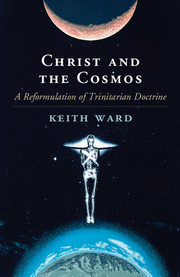Book contents
- Frontmatter
- Contents
- Preface
- Acknowledgements
- PART I THE THREEFOLD NATURE OF THE DIVINE BEING
- PART II THE BIBLICAL SOURCES OF TRINITARIAN THOUGHT
- PART III THE TRINITY, IMMANENT AND ECONOMIC
- PART IV THE SOCIAL TRINITY
- 22 Persons and Substances
- 23 The Idea of a Personal and Free Creation
- 24 The Logical Uniqueness of Persons
- 25 The Divine Nature and Freedom
- 26 Freedom in God and in Creatures
- 27 Persons as Necessarily Relational
- 28 An Ontology of the Personal?
- 29 Intra-Trinitarian Love
- 30 Infinite Gods
- 31 Divine Love and Necessity
- 32 Love and Alterity
- 33 Trinity versus Monotheism
- 34 The Passion of Christ
- 35 God and Abandonment
- PART V THE COSMIC TRINITY
- Bibliography
- Subject Index
- Name Index
32 - Love and Alterity
from PART IV - THE SOCIAL TRINITY
Published online by Cambridge University Press: 05 September 2015
- Frontmatter
- Contents
- Preface
- Acknowledgements
- PART I THE THREEFOLD NATURE OF THE DIVINE BEING
- PART II THE BIBLICAL SOURCES OF TRINITARIAN THOUGHT
- PART III THE TRINITY, IMMANENT AND ECONOMIC
- PART IV THE SOCIAL TRINITY
- 22 Persons and Substances
- 23 The Idea of a Personal and Free Creation
- 24 The Logical Uniqueness of Persons
- 25 The Divine Nature and Freedom
- 26 Freedom in God and in Creatures
- 27 Persons as Necessarily Relational
- 28 An Ontology of the Personal?
- 29 Intra-Trinitarian Love
- 30 Infinite Gods
- 31 Divine Love and Necessity
- 32 Love and Alterity
- 33 Trinity versus Monotheism
- 34 The Passion of Christ
- 35 God and Abandonment
- PART V THE COSMIC TRINITY
- Bibliography
- Subject Index
- Name Index
Summary
No discussion of social Trinitarianism would be complete without reference to the work of Jurgen Moltmann, who is the best-known exponent of an extreme form of what he himself terms a ‘social’ view. In the course of his exposition, he, like Swinburne, develops a powerful analysis of what divine love must be. The analysis is profound, but in the end I think it fails to support social Trinitarianism. Moltmann argues that a being which needs nothing outside itself is somehow morally inferior, self-satisfied, and inward-looking. Aristotle's God, who loves himself as the best of all things, would seem, from this point of view, incurably egotistical and self-centred. But a desire is only selfish if it puts one's own desires before those of others. Where there are no others, selfishness logically cannot exist.
There could be, perhaps, a sort of analogue of selfishness if God preferred ‘lower goods’ to ‘higher goods’, or ‘short-term pleasures’ to ‘long-term pleasures’. But God, being perfectly wise, knowing, and powerful, not logically capable of being tempted by sensual pleasures, and not being short of time, has no reason to choose lower-quality or shorter-term goods. God will always choose the objectively good for its own sake. Since the good is part of the divine reality, that could be seen as a sort of self-love, I suppose. But in this case the ‘self’ would not be opposed to the good. It would not even be capable of being opposed to the good. It would be identical with the good, as both ‘willed’ and ‘loved’ by the self. I have suggested that it makes sense to say that God knows, wills, and loves the supreme good, and in doing so enjoys supreme beatitude. This is a form of threefoldness in God, and it may be the ontological basis of God's threefold being in relation to creation. But it does not entail that God must be constituted by three persons. If there were three persons in God, each divine person would love the good and all would love the same good. None would be selfish, and none, being omnipotent, would need the others.
- Type
- Chapter
- Information
- Christ and the CosmosA Reformulation of Trinitarian Doctrine, pp. 199 - 203Publisher: Cambridge University PressPrint publication year: 2015



